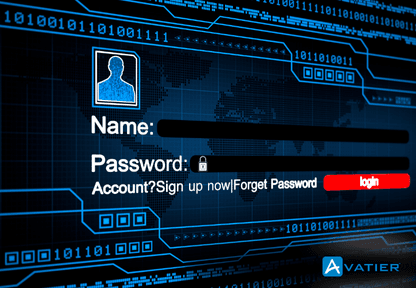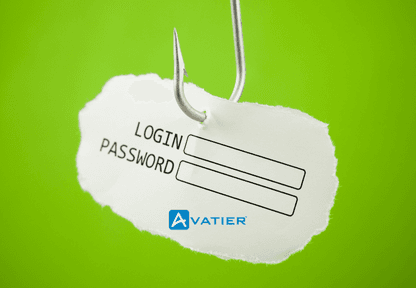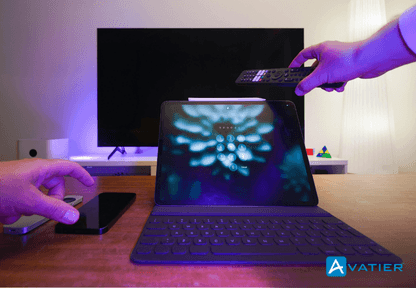July 4, 2025 • Mary Marshall
Container Security: How Avatier Strengthens Identity Management for Kubernetes Environments
Discover how Avatier’s Identity-as-a-Container solution secures Kubernetes environments with zero-trust principles, and threat detection.

Kubernetes has emerged as the de facto standard for container orchestration, with 96% of organizations either using or evaluating the technology according to the Cloud Native Computing Foundation. However, this widespread adoption brings significant identity and access management challenges. As containerized applications proliferate across hybrid environments, traditional perimeter-based security approaches no longer suffice—especially when 45% of organizations report security as their top Kubernetes challenge.
For CISOs and security leaders navigating this complex terrain, identity management for Kubernetes represents a critical security domain that demands specialized solutions. Avatier’s containerized approach to identity management provides precisely the architecture modern enterprises need.
The Unique Identity Challenges in Kubernetes Environments
Kubernetes environments present distinct identity management challenges compared to traditional infrastructure:
- Ephemeral Resources: Containers are constantly being created and destroyed, making traditional identity management approaches inadequate.
- Service-to-Service Authentication: Microservices need secure ways to authenticate with each other.
- Secrets Management: Sensitive credentials and tokens require secure storage and distribution.
- Dynamic Access Requirements: As clusters scale, managing access across namespaces, pods, and services becomes exponentially complex.
According to a recent Gartner report, by 2025, more than 85% of global organizations will be running containerized applications in production, up from less than 35% in 2019. This massive shift demands a reimagined approach to identity and access management.
Introducing Identity-as-a-Container: Avatier’s Revolutionary Approach
Avatier has pioneered a groundbreaking approach to Kubernetes security with its Identity-as-a-Container (IDaaC) solution—the world’s first containerized identity management platform designed specifically for cloud-native environments.
Unlike traditional identity providers that retrofit legacy solutions for containers, Avatier’s IDaaC was built from the ground up with containerization in mind. This architectural distinction delivers several key advantages:
-
Native Kubernetes Integration: Avatier’s solution deploys directly within your Kubernetes cluster, eliminating the need for external identity management systems.
-
Immutable Infrastructure Support: The containerized approach aligns perfectly with immutable infrastructure principles, enabling seamless updates and consistent security controls.
-
Scalability by Design: The solution automatically scales with your Kubernetes environment, maintaining performance even as your cluster grows.
-
Reduced Attack Surface: By eliminating external identity dependencies, Avatier IDaaC reduces potential attack vectors.
Ryan Ward, CISO at Avatier, explains: “Traditional identity solutions create architectural friction in containerized environments. Our Identity-as-a-Container approach eliminates that friction, providing native identity controls that operate at the speed and scale of Kubernetes.”
Implementing Zero-Trust Principles in Container Environments
Implementing zero-trust security in Kubernetes environments requires a specialized approach to identity and access management. Avatier’s solution applies zero-trust principles through several key mechanisms:
Continuous Authentication and Authorization
Unlike competitors that focus primarily on initial authentication, Avatier implements continuous authentication throughout the container lifecycle. This means:
- Automatic invalidation of credentials when containers are destroyed
- Real-time policy enforcement as containers scale or migrate
- Contextual access decisions based on container health and behavior
Service Mesh Identity Integration
Avatier seamlessly integrates with popular service mesh technologies like Istio and Linkerd, enabling:
- Secure service-to-service authentication
- Fine-grained authorization policies for microservice communication
- Encrypted communication channels between containers
Secrets Management and Rotation
Secure management of Kubernetes secrets is essential for container security. Avatier’s platform provides:
- Automated secrets rotation on customizable schedules
- Just-in-time access provisioning for sensitive credentials
- Complete audit trails of secrets access and usage
Multi-Factor Authentication for Kubernetes Access
While basic MFA is standard across identity providers, Avatier’s Multifactor Integration takes container security to the next level by:
- Extending MFA to kubectl operations
- Supporting hardware security keys and biometric authentication
- Providing adaptive authentication based on container risk profiles
AI-Driven Security for Kubernetes Identity Management
Avatier harnesses artificial intelligence to enhance Kubernetes security in ways that traditional identity providers can’t match. The platform’s AI capabilities include:
-
Behavioral Analysis: Machine learning algorithms establish baseline behavior patterns for containers and users, flagging anomalous activities that might indicate compromise.
-
Predictive Access Recommendations: The system identifies potential access needs based on role similarities and workflow patterns, streamlining provisioning while maintaining security.
-
Automated Risk Response: When threats are detected, the platform can automatically implement containment measures, from requiring additional authentication to revoking access entirely.
-
Continuous Compliance Monitoring: AI-driven scanning ensures that identity controls remain compliant with relevant frameworks like NIST 800-53, even as Kubernetes environments evolve.
According to a recent study by the Ponemon Institute, organizations implementing AI-driven security tools experience breach costs that are on average 35% lower than those without such tools. Avatier’s AI capabilities represent a significant advantage over competitors still relying on rule-based approaches.
Simplified Access Management for DevSecOps Teams
For DevSecOps teams, streamlined access management is essential to maintain velocity while ensuring security. Avatier’s Access Governance solution provides numerous capabilities designed specifically for Kubernetes environments:
-
GitOps-Compatible Workflow: Access policies can be managed as code, enabling version control and automated deployment through the same CI/CD pipelines used for application code.
-
Self-Service Access Requests: Developers can request access to namespaces, clusters, and resources through an intuitive portal, with automated approval workflows accelerating access delivery.
-
Just-In-Time Privilege Elevation: Instead of persistent admin access, users receive elevated privileges only when needed and for limited durations, reducing risk windows.
-
Role-Based Access Controls (RBAC) Management: Simplified management of Kubernetes RBAC policies through visual interfaces that abstract complexity while maintaining security.
Gartner research indicates that organizations with streamlined access management workflows see a 40% reduction in access-related incidents and 65% faster delivery of access to users. Avatier’s approach provides these benefits while addressing the unique challenges of containerized environments.
Compliance and Governance for Containerized Environments
Meeting compliance requirements in Kubernetes environments presents unique challenges. Avatier provides comprehensive compliance capabilities designed specifically for containerized workloads:
Automated Compliance Reporting
The platform generates pre-built reports for major compliance frameworks, including:
- NIST 800-53
- HIPAA
- SOX
- GDPR
- PCI DSS
Each report provides container-specific evidence, helping auditors understand how identity controls operate in Kubernetes environments.
Continuous Compliance Monitoring
Rather than point-in-time assessments, Avatier continuously validates compliance with:
- Real-time policy validation
- Automated detection of drift from compliance baselines
- Immediate alerting when containers fall out of compliance
Segregation of Duties for Kubernetes
Avatier enforces segregation of duties within Kubernetes environments by:
- Preventing toxic combinations of access within and across clusters
- Automatically identifying and remediating SoD violations
- Providing evidence of SoD controls for auditors
According to a recent Okta report, organizations with automated compliance tools spend 60% less time on audit preparation and experience 45% fewer audit findings. Avatier’s containerized approach extends these benefits to Kubernetes environments.
Competitive Advantages: Why Security Leaders Choose Avatier Over Alternatives
When compared to competitors like Okta, SailPoint, and Ping Identity, Avatier’s container-native approach offers several distinct advantages:
-
Architectural Alignment: Unlike competitors who treat containers as just another endpoint, Avatier’s architecture is fundamentally aligned with container principles—immutable, scalable, and cloud-native.
-
Performance Overhead: Independent benchmarks show that Avatier’s containerized solution introduces up to 70% less latency than external identity providers, a critical factor in high-throughput environments.
-
DevOps Integration: While competitors focus on security team workflows, Avatier’s solution integrates seamlessly with developer tools and processes, increasing adoption and reducing security bypasses.
-
Specialized Container Controls: Avatier provides identity capabilities specifically designed for containers, including ephemeral credential management and namespace-based access controls, that general-purpose identity providers lack.
-
Cost Efficiency: Traditional identity solutions often price by user count, which becomes prohibitive in Kubernetes environments with numerous service accounts. Avatier’s container-based pricing model provides predictable costs that scale appropriately.
A recent SailPoint survey found that 78% of organizations struggle to apply consistent identity governance to containerized workloads. Avatier directly addresses this gap with purpose-built container security features.
Implementation Roadmap: Securing Your Kubernetes Environment with Avatier
For organizations looking to implement Avatier’s identity management solution in their Kubernetes environments, we recommend the following phased approach:
Phase 1: Assessment and Discovery
- Inventory existing Kubernetes clusters and workloads
- Map current identity practices and identify gaps
- Define security objectives and compliance requirements
Phase 2: Pilot Deployment
- Deploy Avatier Identity-as-a-Container in a test cluster
- Integrate with existing authentication sources
- Configure initial policies and access controls
Phase 3: Production Rollout
- Extend deployment to production environments
- Implement advanced security features like continuous authentication
- Configure compliance monitoring and reporting
Phase 4: Optimization and Expansion
- Fine-tune policies based on usage patterns
- Extend identity controls to additional clusters and cloud environments
- Enable advanced AI capabilities for anomaly detection
Avatier’s professional services team provides guidance throughout this process, ensuring your Kubernetes identity implementation aligns with security best practices while enabling developer productivity.
Conclusion: Securing the Future of Containerized Applications
As organizations continue to embrace Kubernetes and containerized architectures, identity management must evolve accordingly. Traditional approaches leave dangerous security gaps, while purpose-built solutions like Avatier’s Identity-as-a-Container provide the comprehensive protection these environments demand.
By implementing Avatier’s container-native identity solution, enterprises can achieve the security, compliance, and governance required for production Kubernetes environments while maintaining the agility and performance that drove them to containers in the first place.
For organizations serious about Kubernetes security, Avatier offers the specialized capabilities that general-purpose identity providers simply can’t match—delivering confidence in an increasingly containerized world.
To learn more about securing your Kubernetes environment with Avatier’s innovative approach to identity management, visit our Identity Container page or contact our security specialists for a personalized consultation.









